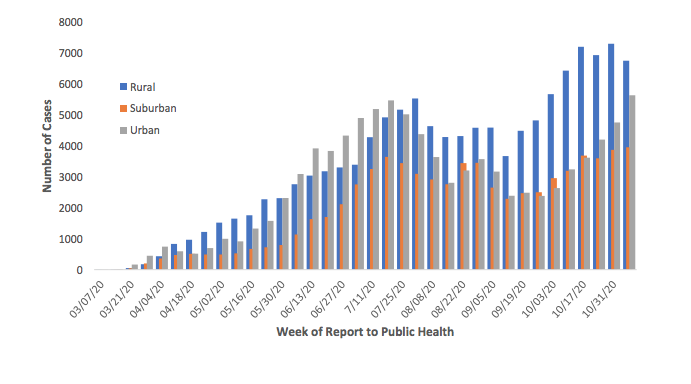With North Carolina hitting the “troubling milestone” of more than 3,000 new COVID-19 cases in a single day on Nov. 11, Dr. Mandy Cohen is concerned. At a press conference on Nov. 12, the state’s secretary of health and human services warned that rising cases present significant risks, especially for rural residents.
Since September, nearly twice as many COVID-19 cases have been reported in rural counties as in urban or suburban areas, according to a new report from the N.C. Department of Health and Human Services. The department defines rural counties as those having an average population density at or below 250 people per square mile.
Most cases in rural areas have occurred in white, non-Hispanic individuals under the age of 49, Cohen said. “The trends are particularly worrisome in these communities because health care can be harder to access,” she said, noting that rural regional hospitals were already experiencing limited resources long before the pandemic. North Carolina’s COVID-19 hospitalizations as of Nov. 11 stood at 1,279, an all-time high, although the state still had 443 available staffed intensive care unit beds.
As with elsewhere in the state, Cohen partly attributed the surge in cases to informal gatherings in social and religious settings where people are “letting their guard down.” Rural counties that were largely spared from the virus earlier in the spring are now facing high levels of viral spread, she added, reiterating that residents must be increasingly vigilant about following the 3Ws: wearing a face covering, waiting 6 feet apart and washing their hands.
In Western North Carolina, Mitchell County has seen the highest per capita increase in COVID-19 cases over the last 14 days at 76 per 10,000 residents. Avery County reported 52, followed by Madison at 51, Yancey at 46, McDowell at 41 and Jackson at 38. Buncombe and Henderson counties, which are both classified as suburban, reported 19 and 18 new cases per 10,000 in the past fortnight, respectively.
College students encouraged to get tested before semester’s end
NCDHHS has sent nearly 75,000 rapid antigen tests to North Carolina colleges and universities to help test all students for COVID-19 before they leave campus for Thanksgiving and winter break. The first shipment was sent to schools in the UNC system on Nov. 12, Cohen said; additional supplies will be distributed this week.
All college and university students are encouraged to get tested before returning to their hometowns, but the guidelines aren’t just for students. “We encourage anyone who is traveling for the holidays to get tested three to four days before,” Cohen explained.
Free testing is available at state and county-run community testing sites. Residents seeking preventative COVID-19 tests from retailers like CVS and Walgreens, which often ask screening questions about potential exposure or symptoms, should indicate that state health officials now recommend pre-travel testing.
In other news
- The numbers on the NCDHHS dashboard will look different on Friday, Nov. 13. A federal change in hospital reporting criteria will likely cause a one-time jump in hospitalizations on Nov. 13 before figures stabilize at a higher level, Cohen explained. The number of cases, deaths and total tests will likely be “artificially low” the same day because NCDHHS will change the time at which data from the previous 24-hour period is pulled into the dashboard.
- The United Way of North Carolina has released its statewide COVID-19 impact survey. Of those responding, 36% said that federal coronavirus relief payments had covered two weeks or less of household expenses; of the 965 responding households with families, only 19% had been able to keep pre-pandemic childcare arrangements. The full report can be found here.
- Applications are now open for the second round of Transylvania Tomorrow’s emergency COVID-19 relief grants. Any small business in Transylvania County is encouraged to apply for a grant of up to $3,000.




Too bad the suckers don’t realize the 50% false positive rate of the PCR test, or the over 99% that won’t have fatalities, that will facilitate the next lock down and further destruction of the economy for those that aren’t global corporations.